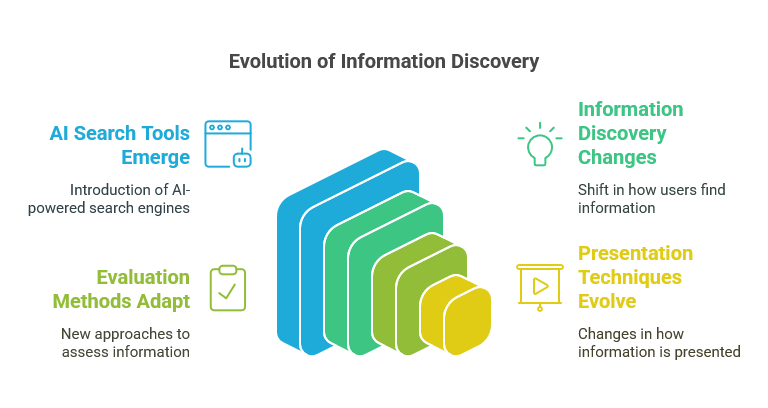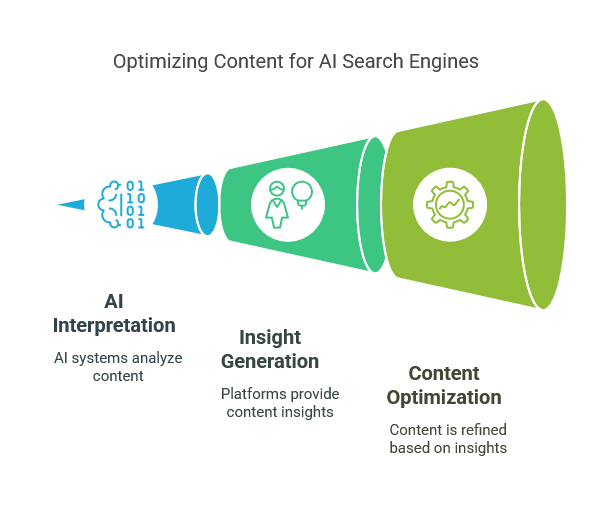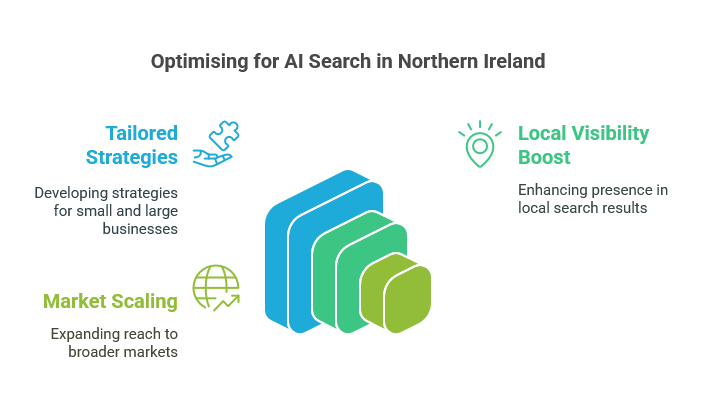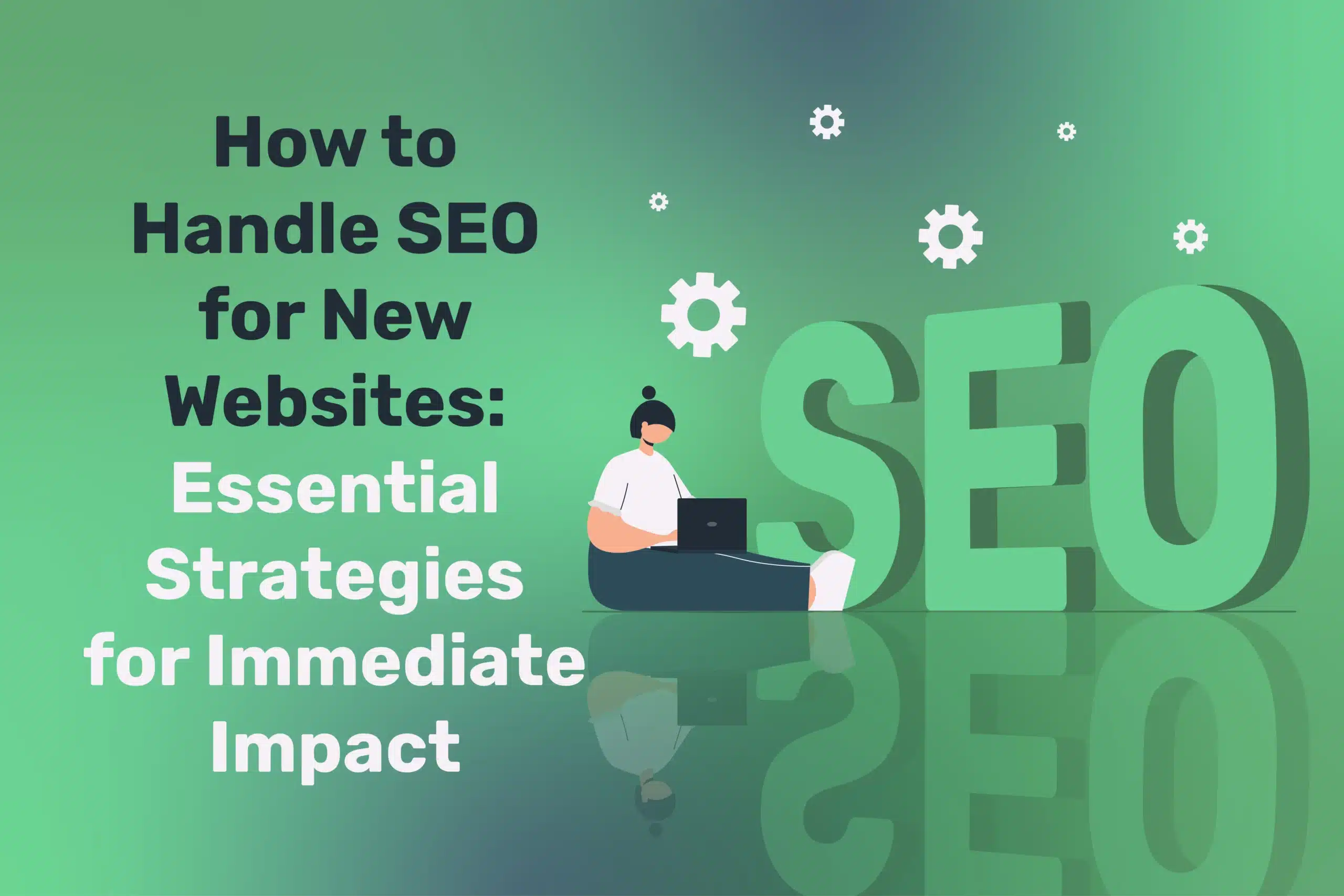
How to Rank in AI Search Engines: The Definitive Guide for 2025
Table of Contents
The search landscape has undergone a profound transformation by integrating artificial intelligence into search engines and knowledge discovery tools. For businesses in Northern Ireland and beyond, achieving visibility in AI-powered search results has become as crucial as traditional search engine rankings. This comprehensive guide explores the strategies, techniques, and best practices for optimising your digital presence for AI search engines in 2025.
Understanding the AI Search Revolution

The emergence of AI search tools—including Google AI Overviews, ChatGPT, Perplexity, and other large language model (LLM) powered search engines—has fundamentally changed how information is discovered, evaluated, and presented to users. These systems operate differently from traditional search engines, requiring adapted optimisation approaches.
Several key differences characterise AI search engines:
- They synthesise information from multiple sources rather than simply linking to websites
- They present direct answers and summaries that often reduce the need for users to click through to websites
- They evaluate content based on perceived expertise, accuracy, and utility rather than traditional ranking signals
- They understand and interpret natural language queries with unprecedented sophistication
“The AI search revolution represents both a challenge and opportunity for businesses,” explains Ciaran Connolly, Director of ProfileTree. Companies that adapt their digital strategies to align with how AI systems evaluate and present information will gain significant competitive advantages in visibility and brand authority. Northern Irish businesses need to understand that ranking in AI search is now as critical as ranking in Google’s traditional search results.
Essential Strategies for AI Search Optimisation
As AI search engines continue to reshape the digital landscape, businesses must adapt their strategies to stay visible and competitive. The following essential strategies are designed to help you optimise your content and digital presence, ensuring that your brand is effectively recognised and ranked by AI-powered search tools. These strategies focus on key areas such as establishing credibility, structuring content for AI interpretation, and leveraging specialised tools to enhance your visibility in AI search results.
Establish Unassailable E-E-A-T Signals
Google’s E-E-A-T principles (Experience, Expertise, Authoritativeness, Trustworthiness) have become even more significant in AI search contexts. AI systems prioritise content from sources they recognise as credible and authoritative.
Implementation Tactics:
Feature Expert Content: Publish content written or reviewed by recognised experts in your field. Include:
- Detailed author biographies with relevant qualifications
- Professional credentials and certifications
- Links to published works and research
- Verifiable experience metrics
Build Authoritative References: Strengthen content credibility by:
- Citing academic journals, industry publications, and regulatory bodies
- Including primary research and data sources
- Linking to established authorities in your field
- Referencing government and educational institutions where appropriate
Demonstrate Consistent Expertise: Establish subject matter authority through:
- Regular publication of in-depth industry analysis
- Thought leadership content on emerging trends
- Case studies demonstrating practical expertise
- Specialised content addressing niche aspects of your field
Optimise Content Structure for AI Interpretation
AI search engines analyse content structure to efficiently identify relevant information. Well-organised content significantly improves the likelihood of being featured in AI search results.
Implementation Tactics:
Create Logical Content Hierarchies: Structure content with clear organisation:
- Use proper heading hierarchy (H1, H2, H3) to segment information
- Ensure each heading accurately describes the content that follows
- Maintain logical progression from general to specific information
- Group related concepts within appropriate sections
Format for Scannability: Make content easy for both humans and AI to parse:
- Include executive summaries or TL;DR sections at the beginning of articles
- Use bullet points and numbered lists for sequential information
- Create comparison tables for product features or service options
- Incorporate clear subheadings that address specific questions
Implement Comprehensive Schema Markup: Use structured data to help AI understand your content:
- FAQ schema for frequently asked questions
- HowTo schema for instructional content
- Article schema for news and blog content
- Product schema for e-commerce offerings
- Local Business schema for location-based businesses
Enhance with Multimodal Elements: Support text with complementary media:
- Include relevant images with descriptive alt text
- Add charts and graphs to illustrate data points
- Incorporate infographics for complex concepts
- Consider using video content with proper transcripts
Target Conversational and Long-Tail Keywords
AI search engines excel at interpreting natural language queries and conversational search patterns. Optimising for these query types improves visibility in AI search results.
Implementation Tactics:
Research Natural Language Queries: Identify how users ask questions about your products or services:
- Analyse customer service interactions and support tickets
- Review forum discussions and social media conversations
- Use tools like AnswerThePublic and AlsoAsked.com to find question patterns
- Monitor voice search queries where possible
Create Focused Content for Specific Queries: Develop dedicated resources that directly address specific questions:
- Build comprehensive FAQ sections with detailed answers
- Create topic-specific pages for niche subject areas
- Develop step-by-step guides for common processes
- Structure content to match the logical flow of user questions
Optimise for Question-Based Searches: Adapt content to align with how questions are asked:
- Include full questions as headings (e.g., “How does AI SEO differ from traditional SEO?”)
- Provide direct answers immediately following question headings
- Group related questions together in topical clusters
- Address follow-up questions users might logically ask next
Build Authority Through Strategic Linking and Mentions
AI search engines evaluate your content partly based on how frequently other authoritative sources reference it. A robust network of quality backlinks and mentions strengthens your position in AI search results.
Implementation Tactics:
Secure High-Quality Backlinks: Focus on earning links from respected sources:
- Industry publications and trade journals
- Educational institutions and research organisations
- Government websites and official resources
- Highly regarded news outlets
Cultivate Brand Mentions Across Platforms: Establish presence on platforms, AI systems reference:
- Wikipedia (where appropriate and following all guidelines)
- Industry-specific forums and communities
- Professional social networks like LinkedIn
- Question-answer sites like Quora and Stack Exchange
Maintain Consistent Brand Identity: Help AI systems connect your content across the web:
- Use consistent naming conventions across all platforms
- Maintain unified messaging and terminology
- Link social profiles to your website using the appropriate schema
- Cross-reference your content using logical internal linking
Prioritise Content Freshness and User Engagement
AI search engines favour current, actively maintained content demonstrating ongoing relevance and user value.
Implementation Tactics:
Establish Regular Update Cycles: Keep content current and accurate:
- Conduct quarterly audits of key content pieces
- Update statistics and references with the latest available data
- Add new insights based on industry developments
- Remove or revise outdated information promptly
Cultivate Meaningful User Interactions: Encourage engagement that signals value:
- Respond to comments and questions on your content
- Facilitate discussions around complex topics
- Gather and showcase user testimonials and reviews
- Create opportunities for community contribution where appropriate
Optimise Technical Performance: Ensure your site meets advanced technical standards:
- Achieve perfect Core Web Vitals scores
- Implement mobile-first design principles
- Minimise server response times
- Ensure accessibility compliance across all content
Leverage Specialised AI SEO Tools

A new generation of tools has emerged to help optimise for AI search engines. These platforms provide valuable insights into how AI systems interpret and evaluate your content.
Implementation Tactics:
Conduct AI-Specific Content Analysis: Use advanced tools to evaluate content for AI readiness.
- Semrush’s Copilot for AI-aware content recommendations
- Clear scope for E-E-A-T signal analysis
- SE Ranking for AI ranking factor assessment
- Koala AI for content optimisation guidance
Monitor AI Search Visibility: Track your presence in AI search results:
- SE Ranking’s AI Results Tracker to monitor the AI overview inclusion
- Advanced Web Rankings’ Google AI Overview Tool for visibility metrics
- BrightLocal for local business AI presence monitoring
- Custom tracking using specialised AI monitoring services
Automate Technical SEO Improvements: Implement AI-powered optimisation tools:
- SEOpital for comprehensive technical audits
- Indexly for accelerated content indexing
- Allia for bulk on-page optimisation
- Surfer SEO for content structure enhancement
Apply the “First and Most Referenced” Strategy
AI systems often demonstrate a preference for sources they have previously cited, creating a compound effect where being referenced once increases the likelihood of future citations.
Implementation Tactics:
Pursue Top Positions in Traditional Search: Maintain strong traditional SEO practices:
- Continue optimising for conventional search ranking factors
- Secure featured snippets where possible
- Achieve local pack inclusion for location-based services
- Maintain strong business profiles on Google Business Profile
Create and Contribute to “Best Of” Content: Establish presence in comparative content:
- Develop authoritative roundup articles in your industry
- Secure inclusion in reputable “Top 10” style content
- Create comparison guides featuring your products or services
- Contribute expert insights to industry benchmark reports
Become the Primary Source: Position your content as the definitive resource:
- Be first to market with an analysis of industry developments
- Publish original research and proprietary data
- Develop unique frameworks and methodologies
- Create terminology and definitions that others reference
Optimise for Voice and Multimodal Search
Voice search and multimodal queries (combining text, image, and voice) are increasingly integrated with AI search systems, requiring specific optimisation approaches.
Implementation Tactics:
Adapt Content for Spoken Queries: Structure content for voice search compatibility:
- Use natural, conversational language throughout the content
- Create concise answers suitable for voice response (40-60 words)
- Incorporate local phrases and colloquialisms where appropriate
- Structure FAQs to match common voice query patterns
Enhance Visual Content for AI Recognition: Prepare media for AI interpretation:
- Add comprehensive alt text to all images
- Include descriptive captions explaining visual content
- Transcribe video and audio content accurately
- Use semantic file names for media assets
Create Multi-Format Content: Develop information in various formats:
- Convert key articles into audio versions
- Create video explanations of complex concepts
- Develop interactive tools that complement text content
- Use diagrams and flowcharts for process-based information
Implementation Guide for Northern Irish Businesses

For businesses in Northern Ireland, optimising for AI search presents unique opportunities and challenges. This implementation guide provides tailored strategies for small and larger businesses, helping you navigate the evolving AI search landscape. Whether aiming to boost local visibility or scale to broader markets, these practical steps will ensure your digital presence is optimised for AI-driven search engines.
Small Business Implementation Strategy
Local businesses can compete effectively in AI search with focused optimisation:
Priority Actions:
- Develop a comprehensive Google Business Profile with regular updates
- Create location-specific FAQ content addressing local customer questions
- Secure mentions in local business directories and community websites
- Build relationships with regional publications for authoritative backlinks
- Implement basic schema markup for local business information
Resource-Efficient Approaches:
- Focus on a single high-value service or product area initially
- Develop expertise in content in manageable phases
- Leverage free or low-cost AI SEO tools for essential optimisation
- Collaborate with complementary local businesses for mutual promotion
- Participate actively in regional business forums and groups
Enterprise Implementation Strategy
Larger organisations require comprehensive, systematic approaches:
Strategic Framework:
- Conduct a comprehensive AI visibility audit across all content
- Develop a subject matter expert network within the organisation
- Create a dedicated AI search optimisation team with cross-functional expertise
- Implement advanced analytics to track AI search performance
- Establish regular content refresh cycles based on AI visibility metrics
Advanced Techniques:
- Develop proprietary datasets and research to establish primary source status.
- Create industry-specific knowledge bases and resource centres
- Implement advanced schema markup across all content types
- Develop API connections with relevant platforms to ensure data consistency
- Establish formal media and publication partnerships for authoritative citations
Industry-Specific AI Search Optimisation
Different industries face unique challenges and opportunities when optimising for AI search. This section delves into industry-specific strategies for AI search optimisation, offering tailored approaches for sectors such as retail, professional services, and tourism. By applying these specialised tactics, businesses can ensure their content stands out in AI-powered search results and meets the specific needs of their target audiences.
Retail and E-commerce
Digital retailers should focus on product-specific optimisation:
- Implement a comprehensive product schema with detailed attributes
- Create comparison content addressing specific product questions
- Develop buying guides that demonstrate product expertise
- Secure inclusion in “best product” roundups and reviews
- Build customer review databases with detailed, specific feedback
Professional Services
Service businesses require credibility-focused approaches:
- Feature practitioner credentials and qualifications prominently
- Develop detailed case studies demonstrating successful outcomes
- Create process-oriented content explaining methodologies
- Secure testimonials from recognised industry figures
- Publish thought leadership content addressing emerging challenges
Tourism and Hospitality
Northern Ireland’s tourism sector benefits from location-specific strategies:
- Create comprehensive destination guides with local expertise
- Develop event-specific content with regular updates
- Implement a location schema with detailed geographic information
- Secure inclusion in travel planning platforms and guides
- Create multi-language content for international visitors
Future-Proofing Your AI Search Strategy
The AI search landscape continues to evolve rapidly. Implementing future-ready approaches ensures sustained visibility:
Monitor Emerging AI Search Platforms
New AI search tools continue to emerge alongside established platforms:
- Track adoption rates of new AI search tools in your target markets
- Experiment with optimisation for emerging platforms
- Monitor how different AI systems represent your brand and content
- Identify platform-specific optimisation opportunities
Adapt to AI Algorithm Developments
AI systems are continuously refined and improved:
- Stay informed about updates to major AI models like GPT, Claude, and Gemini
- Track changes in how Google AI Overviews select and present information
- Monitor industry publications for AI search ranking factor research
- Test and measure the impact of optimisation tactics as algorithms evolve
Prepare for Multimodal Search Expansion
Future AI search will increasingly combine text, image, audio, and video:
- Develop content strategies that integrate multiple media formats
- Ensure all visual content includes proper metadata for AI interpretation
- Create audio versions of key textual content
- Experiment with interactive and immersive content formats
Conclusion: The Strategic Imperative of AI Search Optimisation
As AI search engines continue to reshape how users discover and consume information, businesses must adapt their digital strategies accordingly. The organisations that thrive will be those that understand AI search systems’ unique characteristics and develop content specifically optimised for these platforms.
For Northern Irish businesses competing in local, national, and global markets, visibility in AI search results represents a technical challenge and a strategic business imperative. Organisations can secure prominent positions in the AI search landscape by implementing the strategies outlined in this guide—establishing unquestionable expertise, creating AI-friendly content structures, building authoritative references, and leveraging specialised tools.
The future belongs to businesses that recognise AI search as not just another channel but a fundamental shift in how information is discovered, evaluated, and presented. Those who adapt as soon as possible will establish competitive advantages that will grow increasingly valuable as AI search adoption accelerates.
How ProfileTree Can Help
ProfileTree’s SEO services help businesses across Northern Ireland, Ireland, and the UK implement effective AI search optimisation strategies. Our team offers:
- Comprehensive AI search visibility audits
- Expert content development optimised for AI systems
- Technical implementation of AI-friendly markup and structure
- Ongoing monitoring and optimisation for AI search platforms
Our complementary services can maximise your AI search visibility:
- SEO Belfast for localised AI search presence
- SEO Northern Ireland for regional optimisation
- Website Development with AI-optimised architectures
- Web Design Northern Ireland with AI-friendly user experiences
- Digital Strategy incorporating advanced AI search approaches
- Content Marketing Services optimised for AI discovery
Contact our team to discuss how AI search optimisation can transform your digital visibility and drive business growth.




